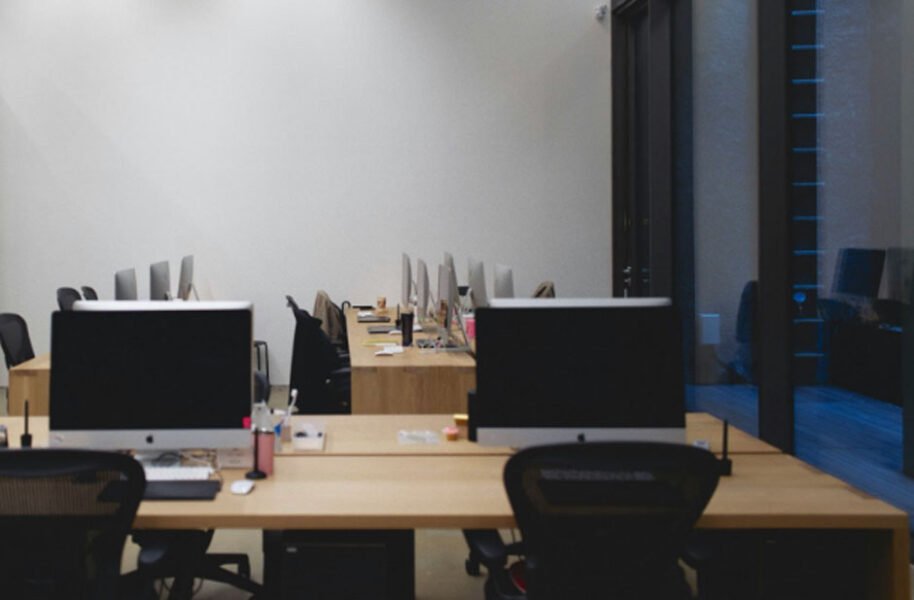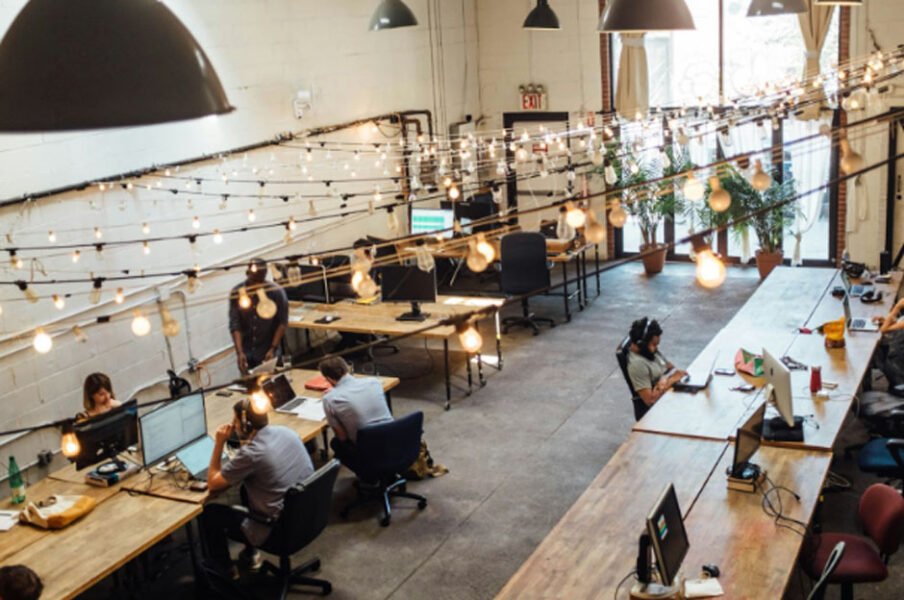Skip to the good bit
ToggleIn a rapidly changing work environment, collaboration spaces have emerged as pivotal in shaping careers and workplace culture. These spaces are transforming how we work, offering flexibility and fostering innovation. This article explores the future of work: how collaboration spaces are shaping careers, influencing career development, employee well-being, and organizational success.
Key Takeaways
- Collaboration spaces have evolved from grassroots hackerspaces to diverse, flexible environments that enhance productivity and support employee well-being.
- The integration of technology in collaboration spaces facilitates real-time communication and remote teamwork, significantly impacting career development and employee engagement.
- Future trends indicate a shift towards hybrid work models and sustainable practices in collaboration spaces, responding to the evolving needs of the workforce and promoting innovation.
Evolution of Collaboration Spaces
The story of collaboration spaces begins in the mid-1990s with the rise of hackerspaces, communal environments where tech enthusiasts would gather to share resources and ideas. This grassroots movement created the groundwork for the coworking phenomenon that officially took off in the early 2000s. As the gig economy gained momentum, the demand for flexible and affordable workspace solutions surged, giving rise to modern coworking spaces.
Today, these office spaces are designed to cater to the diverse needs of the modern workforce. They offer a variety of work solutions, including private offices, dedicated workstations, and hotdesking options, providing flexibility and a sense of community.
Premium providers such as the Centennial Business Suite exemplify how modern workspaces now combine professional infrastructure with collaborative environments. Unlike traditional office settings, coworking spaces are known for their dynamic atmosphere, which can significantly enhance productivity and foster a collaborative work environment. The evolution of these spaces reflects a broader shift towards more adaptable and inclusive work environments that prioritize employee well-being and innovation.
Looking ahead, the future of coworking spaces seems poised for further transformation. As the needs of organizations continue to evolve, these spaces are expected to offer even more specialized solutions tailored to specific industries and collaborative needs. This evolution will likely incorporate advanced technological integrations and sustainable design principles, ensuring that collaboration spaces remain at the forefront of the future of work.
The Role of Collaboration Spaces in Career Development

The shift toward collaborative environments was significantly accelerated by the COVID-19 pandemic, which forced many organizations to adopt remote work and virtual collaboration tools. Since then, project management software and virtual workspaces have become essential by:
- Creating centralized platforms where teams can manage tasks, resources, and timelines with remarkable efficiency.
- Replicating the functionalities of physical offices.
- Offering virtual meeting rooms.
- Providing project management capabilities that support seamless collaboration.
Collaboration spaces also play a crucial role in fostering social interactions, which are vital for reducing loneliness and improving mental health. The opportunity to engage with colleagues in a shared environment, whether physical or virtual, can significantly enhance an individual’s professional life. This sense of community is not only beneficial for mental well-being but also for professional growth, as it encourages knowledge sharing and networking, providing essential mental health support.
Moreover, the advent of cloud computing has revolutionized data accessibility, enabling employees to work remotely while collaborating in real-time. This technology ensures that team members can access and share documents from anywhere, facilitating continuous and effective teamwork. In this way, collaboration platforms are instrumental in creating a more flexible and inclusive work environment that supports career development and success.
Enhancing Employee Well-being and Work-life Balance
Flexible work arrangements facilitated by collaboration spaces have been shown to significantly enhance job satisfaction and promote a healthy work life balance, contributing to a better work-life balance. Employees who have the option to work in hybrid models—splitting their time between remote work and on-site presence—tend to report higher morale and job satisfaction. This increased flexibility allows for more personalized work schedules, accommodating the diverse needs of the modern workforce, including more flexible working hours.
The physical design of collaboration spaces plays a crucial role in boosting employee well-being through:
- Natural light
- Comfortable seating
- Biophilic design elements such as indoor plants and natural materials
- Ergonomic office furniture to promote comfort and reduce the risk of work-related injuries
- Improved acoustics to help maintain concentration and minimize distractions. These elements are increasingly incorporated to enhance productivity and engagement.
Sustainable office designs that focus on reducing carbon emissions and using eco-friendly materials are also becoming more prevalent. Features include:
- Natural lighting
- Advanced ventilation systems
- Energy-efficient technologies. These features are not only good for the environment but also contribute to a healthier and more motivating work environment.
Some coworking spaces even integrate wellness-focused features, like fitness areas with specialized equipment such as pin-loaded machines, helping members maintain health while balancing work.
By fostering a sense of community and belonging, collaboration spaces can effectively combat feelings of isolation and lethargy, thereby boosting productivity.
Impact on Workplace Culture and Employee Engagement
Collaboration spaces have a profound impact on workplace culture by breaking down hierarchical barriers and promoting a more inclusive environment. These spaces encourage spontaneous interactions and social connections among employees, leading to stronger personal relationships and a sense of community. This sense of belonging can significantly enhance employee engagement and job satisfaction, creating a more vibrant and cohesive work culture.
The adaptable layouts of collaboration spaces support various group sizes and activities, making them ideal for diverse collaborative needs. This flexibility allows for more efficient teamwork and faster decision-making, enhancing business agility. Moreover, the diversity of skills and perspectives brought together in collaborative environments can lead to more innovative solutions and a better understanding of each individual’s role within the organization.
By alleviating feelings of isolation among remote workers, collaboration spaces also contribute to improved employee well-being. This holistic approach to workplace culture not only boosts morale but also fosters a more engaged and productive workforce.
Technological Advancements in Collaboration Spaces
Technological advancements have revolutionized collaboration spaces by enabling:
- Real-time interactions and seamless communication across geographical boundaries.
- Virtual workspaces supported by high-speed internet and robust digital infrastructure, facilitating remote working and effective team collaboration from anywhere in the world.
- Widespread adoption of cloud computing provides secure and scalable access to data and allows simultaneous document collaboration among multiple users.
Beyond IT tools, modern collaboration environments also cater to specific professional needs. For example, research-focused workspaces may integrate advanced lab infrastructure, including tools like a laboratory bath, to support scientific or technical projects.
As technology continues to evolve, the integration of artificial intelligence and other advanced technologies will further enhance the human capabilities of collaboration spaces. This ongoing innovation promises to create even more efficient and effective work environments that support the diverse needs of the modern workforce.
Driving Sustainable Practices in Modern Work Environments
Sustainability is becoming an increasingly important aspect of modern work environments, and collaboration spaces are no exception. Adopting renewable energy sources like solar panels enables these spaces to significantly reduce their carbon footprint and promote a healthier planet. The shift towards green buildings and sustainable office designs aligns with the values of many organizations, enhancing their commitment to environmental stewardship.
Implementing sustainable practices in collaboration spaces not only benefits the environment but also improves employee morale. A work environment that prioritizes sustainability can foster a sense of pride and purpose among employees, encouraging them to engage more deeply with their work and the organization’s mission. This alignment of values can lead to increased productivity and a stronger sense of community within the workplace.
Furthermore, sustainable practices can enhance the overall well-being of employees by creating healthier and more comfortable work environments. Features such as:
- natural lighting
- advanced ventilation systems
- Eco-friendly materials contribute to a more pleasant and motivating workspace, ultimately boosting productivity and job satisfaction.
Future Trends in Collaboration Spaces
The future of collaboration spaces is set to be shaped by several key trends. Hybrid work models are becoming the new standard, combining the flexibility of remote work with the benefits of in-person collaboration. This approach allows organizations to meet the evolving needs of their workforce while maintaining productivity and engagement. Specialized coworking spaces tailored to specific industry needs are also gaining traction, providing environments that foster innovation and support the unique requirements of different sectors.
Technological advancements will continue to transform collaboration spaces in unexpected ways. Key trends include:
- Enhanced digital tools and support for remote work, ensuring teams can collaborate effectively regardless of their physical location.
- Customization allows individuals to reflect their personalities.
- Minimalist design, promoting efficiency in the workspace.
As organizations adapt to these work trends, they will be better positioned to attract and retain top talent, maintain competitive advantage, and drive innovation across the entire organization. The ongoing evolution of collaboration spaces aims to create work environments that are more productive, engaging, and fulfilling for employees, ensuring they have access to the best talent from companies in labor markets through effective talent management.
Summary
In summary, collaboration spaces are playing a transformative role in shaping the future of work. From their humble beginnings as hackerspaces to their current status as dynamic hubs of innovation, these spaces offer numerous benefits for career development, employee well-being, workplace culture, and sustainability. Technological advancements and future trends promise to further enhance their impact, creating work environments that are flexible, inclusive, and conducive to productivity and innovation.
As we look ahead, it is clear that collaboration spaces will continue to evolve, adapting to the changing needs of the modern workforce. By embracing these spaces and the opportunities they offer, organizations can foster a more engaged, satisfied, and innovative workforce, ultimately driving success in the ever-evolving landscape of work.







